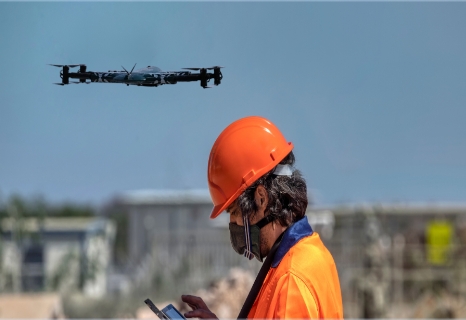The construction industry is rapidly progressing thanks to drone technology. The field of bridge construction is one where this transformation is most visible. Unmanned aerial vehicles, or UAVs, are growing immensely popular, helping the construction industry innovate engineering strategies. Drone applications have become increasingly adaptable, from package delivery to aerial photography.
Bridge construction benefited greatly from the use of the best construction drones. Drones are evolving as a necessary instrument for ensuring quality and tracking the advancement of construction projects. The construction sector constantly implements efficient, cutting-edge technologies to boost productivity, security, and affordability.
This article will discuss how UAV technology is building a new future in the construction of bridges.
The Different Types of Bridges
Bridges are essential to railroad and highway transportation networks because they act as “lifelines” for the community’s infrastructure. They link towns and promote trade by enabling the movement of people and commodities over valleys, rivers, and other barriers. The best construction drones assist in constructing today’s modern types of bridges.
There are seven different types of bridges, and they are:
Suspension Bridge
A suspension bridge has cables hanging from it to support the weight of the bridge deck. The wires connect to large towers or pylons supported by massive concrete foundations. Suspension bridges are ideal for deep valleys and large bodies of water.
Arch Bridge
Arch bridges’ semicircular, curved shapes aid in equally distributing the structure’s weight. The arch has supporting attachments at both ends and commonly comprises stone, brick, or concrete. Arch bridges are more robust, long-lasting, and can cover greater distances than beam or truss bridges.
Beam Bridge
The most basic and prevalent kind of bridges are beam bridges. They consist of one horizontal beam that crosses two or more piers, which are vertical supports. Beam bridges are appropriate for distances since they are simple to construct and economical.
Cable-Stayed Bridge
The bridge utilizes cables to carry the deck’s weight. The cable network extends from pylons or towers. Most contractors use the best drones for construction to inspect these types of bridges. Cable-style bridges are flexible and can withstand earthquakes.
The span length, location, topography, and other considerations can help engineers and builders select the best bridge. As technology evolves, the best construction drones assist contractors in improving building bridges.
The Five Benefits of Construction Drones in Bridge Maintenance
Inspections of traditional bridges are usually costly, time-consuming, and challenging. For the engineers to inspect the underside of the bridge, they need specialized and expensive inspection equipment. Nevertheless, the inspection findings still need improvement even with such machinery. Accessible regions and increased risk exposure for the inspector are necessary for a complete inspection.
Choosing the best drone for construction and inspection offers a safer and more efficient alternative. UAVs provide a low-cost substitute for quickly detecting issues with bridge performance, capacity reduction, and damage. Drones are affordable and easy to deploy, making them the best option for inspections regularly.
Listed below are the five benefits of using construction UAVs for bridge inspections:
#1. Increased Public and Worker Safety
Drones can handle most life-threatening tasks far more quickly and for a fraction of the price than a traditional method. They can operate in various weather conditions and remove most of the hazards. As a result, drones can swiftly check for bridge hazards following natural disasters like storms, hail, and more.
Personnel are at risk while using traditional bridge inspection techniques, and the general public and users are also at risk. Workers frequently hang from the sides or below when evaluating the main components of bridges. The size and architecture of the bridge determine the inspection’s complexity, dangers, and safety measures. Larger bridges that span swift-moving rivers or vast bodies of water are riskier, particularly when they are crowded.
In certain situations, it’s necessary to close the bridges to reduce disruptions and user dangers. Construction drone services can include closer inspection of crevices, which no longer requires workers to suspend under bridges.
#2. Finding Flaws is Simple and Quick
The use of drones makes it easier and faster to locate defects, both current and potential. The engineers and other construction specialists know how to take the appropriate measures because of early detection. The bridge’s safe operation remains assured by prompt maintenance. With UAV technology, experts can thoroughly inspect bridges to find structural flaws and places with excessive wear.
Drones not only expedite and improve the safety of inspections but also simplify the process of documenting analytical reports. Drone data collection is another way to improve defect records and workflow.
#3. Gathering Detailed Information On Bridge Status
Conventional bridge inspections are typically more challenging, unsafe, expensive, and time-consuming than drone inspections. The best drones for construction provide exceptional and accurate images. Drones utilized for inspection can provide visual, infrared, and three-dimensional modeling details of bridges with auxiliary software.
Engineers can benefit from drones in many ways, including those fitted with HD cameras, infrared cameras, and proximity sensors. Experts can use UAVs’ high-quality, detailed photos to discover wear, flaws, and hot spots.
Some drone models are customizable with analytics software, 3D imaging, and other tools. These features boost a drone’s ability to acquire information and identify faults such as cracks, spalls, wear, and rust.
#4. 3D Modeling
Utilizing drones aids in producing the bridges’ 3D models. These are beneficial for the following projects and helpful in detecting flaws. Detailed information from the best construction drones is vital in mapping structural improvements. Unlike human workers, UAVs can access nearly every bridge section, including its top, sides, and underside.
Drones can access limited locations, difficult-to-reach places, and other regions that would be challenging for humans to analyze comprehensively. UAVs can assist with creating 3D models of the structure when fitted with the appropriate software. 3D models help make comparisons and locate defects.
#5. Lower Inspection Costs
Using drones to check various bridge designs offers a quicker, safer, and more affordable alternative. UAVs can survey hard-to-reach areas without expensive equipment, such as ladders, harnesses, or other gear.
Construction drone photography allows for quicker and safer bridge inspections, all while saving a significant amount of funds. Drones save motorists from wasting time by removing the need to close the bridge to traffic. UAVs typically create less interference than conventional methods and require less traffic control.
Conclusion
Drones are becoming a more efficient tool for inspecting bridges these days. Compared to more conventional approaches, they offer advantages, including increased safety and cost savings. The best construction drones help inspectors reduce the hazards, labor, and expenses related to using conventional approaches.
To analyze drone data and offer insights into the structures, software engineers create efficient image processing and display solutions. Thanks to software technologies, bridge engineers can more affordably identify and address any prospective or current issue areas. There will be new kinds of bridges as long as technology keeps developing. It allows us to push the limits of what is practical for the design and construction of bridges.



